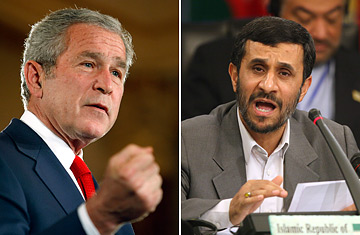
President Bush and Iranian President Mahmoud Ahmadinejad
The U.S. on Thursday announced its toughest sanctions against Iran since the 1979 revolution that swept the mullahs to power. But the new measures may actually signal a splintering of the international consensus pressuring Tehran to curb its nuclear program. That's because the primary target of those sanctions is not the Iranian institutions they single out — the Iranian Revolutionary Guard Corps (IRGC) and its Quds Brigades. The teeth in the new measures derives from the fact that they target anyone who is doing business with those Iranian institutions and individuals. And that means doing business with Iran at all, because as Treasury Secretary Hank Paulson put it, the IRGC "is so deeply entrenched in Iran's economy and commercial enterprises, it is increasingly likely that if you are doing business with Iran, you are doing business with [the Guard]." Administration officials told the New York Times that a key purpose of the new measures was "to persuade foreign governments and financial institutions to cut ties with Iranian businesses and individuals."
The move comes amid U.S. frustration at its failure to elicit sufficient support for new U.N. Security Council sanctions aimed at forcing Iran to suspend uranium enrichment, and at the slow progress of efforts to persuade European countries and institutions that do business with Iran to voluntarily desist. Some of Iran's biggest European trading partners, such as Italy and Germany, oppose unilateral sanctions, warning that if their companies were to withdraw from Iran, they would simply be replaced by competitors from Russia and China. But to the extent that the latest U.S. moves are used to pressure third-country governments, banks and corporations doing business with Iran, they will be perceived as Washington using its muscle in the international financial system to impose its own Iran policy on others. And resentment may not be the only consequence. China, for example, would be unlikely to accept any U.S. effort to stop any of its corporations from doing important business with Iran, and could threaten economic countermeasures to deter such action.
While the U.S. call to ratchet up economic pressure on Iran is strongly backed by Britain and France, Russia and China have both warned against taking unilateral measures outside of the U.N. Italy and Germany, Iran's largest European trading partners, have also opposed moves to pressure Iran outside of the U.N. Security Council. The move suggests the U.S. may be reverting to a "coalition of the willing" model for dealing with Iran. Yet the case Washington makes for escalating sanctions — the claim that Iran is pursuing nuclear weapons, and that shutting down its uranium-enrichment program is a matter of urgency to prevent it attaining the know-how to build a bomb — is not the international consensus. Russia's President Vladimir Putin last week visited Tehran, and made clear that Russia sees no evidence that Iran is actually pursuing nuclear weapons — contradicting the U.S. charge that the civilian nuclear technologies Iran seeks will give it the means eventually to build such weapons.
Russia, though, may hold the best cards for pressuring Iran into compromise, not only because of its role in restraining Security Council action but because it is Tehran's major weapons supplier and is also building Iran's nuclear power plant at Bushehr. During his visit to Tehran, Putin is reported to have offered the Iranians a new proposal to defuse the standoff. Crucially, Putin met separately with both President Mahmoud Ahmadinejad and with Supreme Leader Ayatollah Ali Khamenei, who wields executive power over foreign and security policy in Iran's complex political system. Iran's then-chief negotiator, the conservative pragmatist Ali Larijani, welcomed the Russian proposal and said it would be studied. But Ahmadinejad, widely criticized inside the corridors of power for his combative handling of the nuclear issue, denied that any new proposal had been received. Within days, Larijani had resigned as nuclear negotiator, which some commentators read as evidence of Ahmadinejad's consolidation of power.
In fact, it was difficult to read that move as a clear-cut victory for Ahmadinejad's more strident approach, because Supreme Leader Khamenei then sent Larijani as his personal representative to nuclear talks with European leaders in Rome on Tuesday, alongside a new negotiator appointed by the President. The signs of open disagreement among different elements of the Iranian leadership suggest that international pressure is being felt in Tehran's corridors of power. But the multiplicity of views and agendas competing to shape policy both within Iran and in international capitals makes achieving a diplomatic solution that much more difficult.
